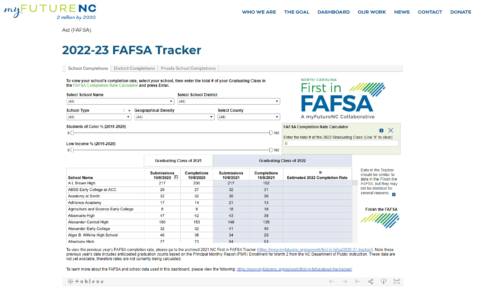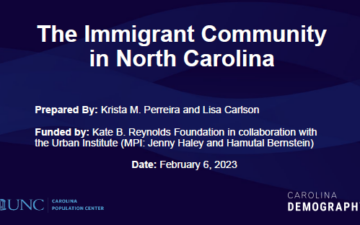NC First in FAFSA tool live for 2022-23 cycle

The application cycle for the 2022-23 Free Application for Federal Student Aid (FAFSA®) cycle began on October 1, 2021 and runs through 11:59 p.m. Central time (CT) on June 30, 2023. Students are strongly recommended to fill out the form as soon as possible after October 1 because awards are made until funds are depleted. Federal Student Aid, an office of the U.S. Department of Education, provides more than $150 billion in financial aid each year.
Completing the FAFSA is strongly and positively associated with postsecondary enrollment. An analysis of data from the National Center for Education Statistics shows that 88% of high school seniors who completed a FAFSA in 2012-13 had attended college by February 2016, compared to 49% of students who did not file a FAFSA.
FAFSA completion is also a critical component of working towards the myFutureNC (MFNC) goal of ensuring that 2 million North Carolinians have a postsecondary degree or credential by 2030.
FAFSA completion rates fell during the pandemic. According to the National College Action Network, as of early July 2, 2021, FAFSA applications were down 4.8% for the high school class of 2021 compared to the prior year. Data from the National College Attainment Network shows that these percentages were larger in high schools with more than 40% Black and Hispanic students; those schools saw an 8.1% drop in FAFSA completions compared to a decline of 2.2% in schools with lower shares of Black and Hispanic students.
Tracking completion rates
Tracking FAFSA completion rates can help school districts and schools better target their efforts to reach students in their districts.
We developed the NC First in FAFSA tool for last year’s FAFSA cycle with MFNC, the North Carolina State Education Assistance Authority (NCSEAA), and school counselors. The tracker helps guidance counselors, principals, and school administrators view their current estimated completion percentages, track their progress over time, compare to other schools, and even view district level totals.
How we calculate the numbers
Data about submission and completion numbers for the FAFSA are provided by Federal Student Aid (FSA) and enrollment is drawn from the North Carolina Department of Public Instruction (NC DPI). Using these values, we calculate a completion rate for each public school (including charters) and Local Education Agency (LEA) in the state. Private school enrollment data is not available but the tracker provides information on FAFSA completions for these schools.
Launching the 2022-23 FAFSA Tracker
On October 19th, we’re releasing the first iteration of the 2022-23 FAFSA Tracker. It will initially look quite different from last year’s version. FSA data on completed and submitted FAFSA forms for the new cycle are available starting in mid-October. However, NC DPI does not release the enrollment data we use until later this year (Month 2 of Principal’s Monthly Report). Therefore, we are unable to calculate completion rates until the beginning of 2022.
This preliminary tracker will contain 3 text tables containing only submission and completion values from FSA at these levels:
While enrollment data are not included, there is a new feature that will allow users to enter their own estimated number of graduating seniors, so they can see an unofficial completion rate for their school or district.
What we learned from last year
We integrated a lot of what we learned from last year’s FAFSA Tracker in this year’s iteration. Feedback from educators and partners helped us refine the tracker and make it easier to use. Some things you’ll notice:
First in FAFSA Collaboration Recognized by PIE
The Policy Innovators in Education (PIE) Network builds, supports and promotes a network of education advocacy organizations working to improve K-12 education in their states so that every student graduates high school world-ready. Ever year, PIE also gives out awards for in various categories to the organizations working in the sphere mentioned above. The First in FAFSA collaboration was given an Honorable Mention for “Best Collaboration” during the 2021 awards.
The Best Collaboration category features coalitions of leaders and organizations who worked together to achieve a significant impact for students and families.
The First in FAFSA partnership encompassed a number of activities, including the launch of the FAFSA tracker and the website. In addition, the coalition of partners across North Carolina expanded access to 97% of public high schools to Finish the FAFSA, created a community of practice for practitioners in 42 priority districts that came together as a FAFSA network sharing in promising practices, developed and disseminated FAFSA Completion resources such as the Peer into Your Future First Generation Series, social media toolkits, mythbuster resources and bi-monthly newsletters; conducted training and webinars reaching nearly 500 counselors, college advisors and youth-serving organizations and offered important virtual and in-person bilingual assistance to Latinx students and their families.
Need help understanding population change and its impacts on your community or business? Carolina Demography offers demographic research tailored to your needs.
Contact us today for a free initial consultation.
Contact UsCategories: Education

The Center for Women’s Health Research (CWHR) at the University of North Carolina School of Medicine released the 12th edition of our North Carolina Women’s Health Report Card on May 9, 2022. This document is a progress report on the…

Dr. Krista Perreira is a health economist who studies disparities in health, education, and economic well-being. In collaboration with the Urban Institute, she recently co-led a study funded by the Kate B. Reynolds Foundation to study barriers to access to…

Our material helped the NC Local News Lab Fund better understand and then prioritize their funding to better serve existing and future grant recipients in North Carolina. The North Carolina Local News Lab Fund was established in 2017 to strengthen…
Your support is critical to our mission of measuring, understanding, and predicting population change and its impact. Donate to Carolina Demography today.